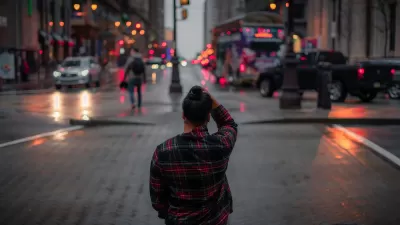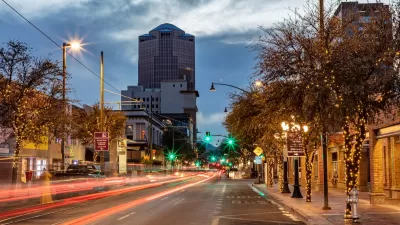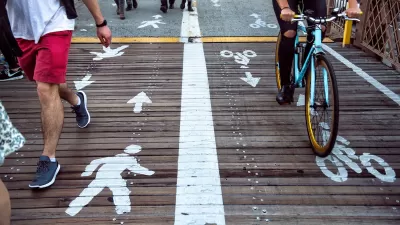American pedestrians are moving faster and spending less time connecting with other people when walking down city streets.

American pedestrians are spending less time hanging out on sidewalks and streets, according to a new study from the National Bureau of Economic Research.
As David Zipper explains in Bloomberg CityLab, the researchers used artificial intelligence to analyze video footage from 1980 and 2010, noticing that people walk faster and spent less time interacting than they used to. “They seemed to be having fewer of the informal encounters that undergird civil society and strengthen urban economies.”
While the analysis doesn’t explain why behavior patterns have changed, the researchers offered several possible explanations. “City dwellers might be having fewer social interactions of all kinds, a phenomenon that has been linked to rising rates of loneliness. And some of the pedestrians observed in 2010 could have been socializing remotely: By then, 80% of US adults had cellphones.”
People may also be using more commercial third spaces like coffee shops and bars to socialize, particularly in places where public space is not comfortable or inviting. This leads to people spending more time around people who are similar to them, sharing similar economic backgrounds and experiences.
For the researchers, the shift is troubling. “Beyond creating personal connections, human exchange fuels economic productivity as people figure out how to do their job more efficiently or find inspiration for a new venture. Benefits reverberate citywide, and even across society writ large.”
FULL STORY: What Happened to Hanging Out on the Street?

Maui's Vacation Rental Debate Turns Ugly
Verbal attacks, misinformation campaigns and fistfights plague a high-stakes debate to convert thousands of vacation rentals into long-term housing.

Planetizen Federal Action Tracker
A weekly monitor of how Trump’s orders and actions are impacting planners and planning in America.

Chicago’s Ghost Rails
Just beneath the surface of the modern city lie the remnants of its expansive early 20th-century streetcar system.

Bend, Oregon Zoning Reforms Prioritize Small-Scale Housing
The city altered its zoning code to allow multi-family housing and eliminated parking mandates citywide.

Amtrak Cutting Jobs, Funding to High-Speed Rail
The agency plans to cut 10 percent of its workforce and has confirmed it will not fund new high-speed rail projects.

LA Denies Basic Services to Unhoused Residents
The city has repeatedly failed to respond to requests for trash pickup at encampment sites, and eliminated a program that provided mobile showers and toilets.
Urban Design for Planners 1: Software Tools
This six-course series explores essential urban design concepts using open source software and equips planners with the tools they need to participate fully in the urban design process.
Planning for Universal Design
Learn the tools for implementing Universal Design in planning regulations.
planning NEXT
Appalachian Highlands Housing Partners
Mpact (founded as Rail~Volution)
City of Camden Redevelopment Agency
City of Astoria
City of Portland
City of Laramie





























